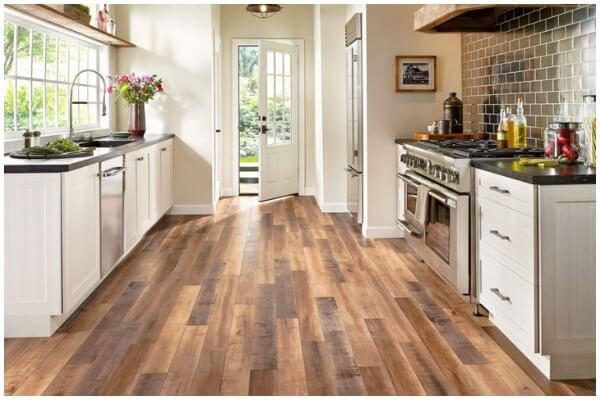Ideally, your home’s flooring needs to last as long as possible. The flooring should be durable enough to withstand all sorts of impacts and damages.
Regular maintenance is required to preserve the condition of your floors. In addition, the type of flooring you choose will also make a difference in its longevity.
As you browse the different types of flooring, consider several factors. The comfort and appearance are obviously important but don’t just focus on the aesthetics.
Ensure the flooring is durable, easy to maintain, and built to last. After all, a strong floor will be poised to stay for a lifetime!
These seven flooring options are known for their durability and sturdiness:

1. Ceramic
Ceramic is the go-to option for the everyday homeowner and professional designers as well. Sometimes, wooden flooring types may not be possible to use.
As such, a ceramic alternative is the best possible choice. No matter what impact occurs on it, from scratches to spills, they are built to withstand damage.
When there’s a deliberate force put onto ceramic flooring, it may be susceptible to cracks. Therefore, it is in your best interest to be careful during its installation. Ceramic flooring types are built to last, but you need to take care of them as well.
2. Laminate
Contrary to popular belief, laminate flooring types are sturdier than most would believe. In prior years, they would’ve been vulnerable to even the lightest of physical impacts.
As technology has improved in subsequent decades, manufacturers created a more durable type. Plus, it is still relatively inexpensive to install.
Laminate flooring’s durability comes from the topmost layer in its texture. The transparent wear layer is almost impervious to most household scratches, such as furniture movement.
However, there are variations between which kind of laminate flooring to go with. Choose a vinyl alternative.
3. Hardwood
Of course, when laminate flooring falters, hardwood does not. If you prefer an authentic type of flooring in your household, hardwood is the way to go.
Not only is it highly resistant to physical impacts, but hardwood flooring brings with it an authentic finish as well. Hardwood flooring has built-in protective measures in the event of random scratches occurring.
Should this happen to you, all that is needed is some sanding. Most of the time, homeowners can fix the scratches unless a more thorough repair is necessary. As long as you keep your hardwood floors clean, you can admire its natural beauty as soon as you enter your home!
4. Concrete
In some cases, homeowners may prefer an extremely durable flooring option. Concrete fits this set of circumstances, becoming more common than their wooden counterparts.
Even if they are lacking in the visual department, they can be considered the sturdiest of most flooring types. Virtually all physical impacts have little to no effect.
One key aspect to note, as it pertains to concrete flooring, is comfort. It may be a bit cumbersome to walk over concrete, especially if it is still in a raw form. If you are keen on installing it in your home, ensure it is refined enough to be as comfortable as possible.
Also Read: Carpet vs Hardwood Floor What’s Best for Your Home
5. Bamboo
Many professional services discuss this flooring option as one of the most durable types available. Similar by comparison to hardwood flooring, bamboo is just as sturdy and sustainable. In addition, it is very water-resistant, allowing it to remain damage-free from accidental liquid spillage.
For the homeowner’s benefit, it is also much easier to clean and refine. This can be incredibly practical, especially as the years go by. For those who want to maximize their floor’s potential, bamboo is the way to go in terms of toughness!
Also Read: 4 Key Benefits of Professional Timber Flooring Installation
6. Engineered Wood
Sometimes, moisture plays a huge role in determining the overall longevity of our floors. It can be a significant impact, especially where overall quality is concerned. Engineered wood flooring options are better choices than hardwood flooring.
Due to its composition, it can resist moisture through a wear layer and veneer combination. You can also increase the thickness of this layer, which allows you to conduct sanding more thoroughly.
7. The Finish
No matter what sort of flooring option you inevitably go with, it is vital to consider the finish as well. Generally, there are two types to think about. Oil-based polyurethane is suited for those who prefer a warm appearance to their floors. On the other hand, acrylic urethane makes the floor’s resin more resilient.